All About Food | November 29th, 2017
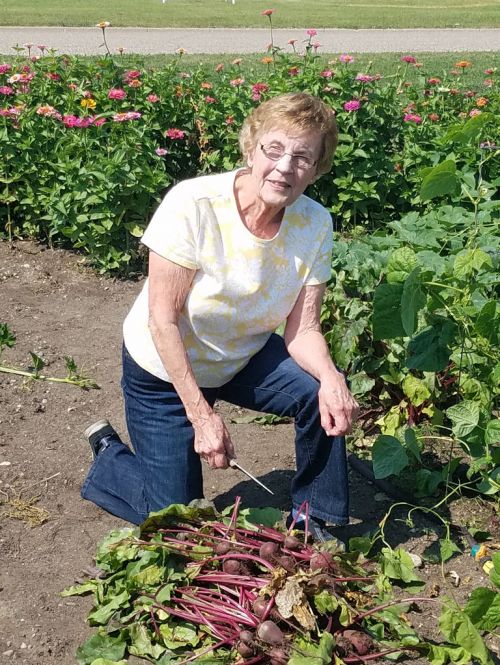
GRHC and Prairie Public release documentary and cookbook
The kitchen is often said to be the heart of the home -- in fact, some of the most valuable lessons I’ve learned in life were in a kitchen and from a German grandmother. Growing up she taught me a thing or two in the kitchen, never measuring and never missing a beat.
“Gutes Essen” is German for “good eating.” “Gutes Essen-Good eating in German-Russian country” is also the name of Prairie Public’s latest documentary as well as its companion cookbook. It not only celebrates their culinary traditions but also shares anecdotes and valuable cultural traditions of the Germans from Russia. According to the Germans from Russia Heritage Collection (GRHC), the Germans from Russia were the largest immigrant group in North Dakota.
Though the German Russians settled throughout the state, the highest concentration of Germans from Russia settled in the south central part of North Dakota in Emmons, McIntosh, and Logan counties, starting in the 1880s. Today those counties join forces to form the Tri-County Tourism Alliance, with the intent of promoting and perpetuating the cultural traditions of their ancestors.
“Gutes Essen perhaps developed from the success of Prairie Public's 2000 documentary, “Scheckmest: Good Traditions of the Germans from Russia.”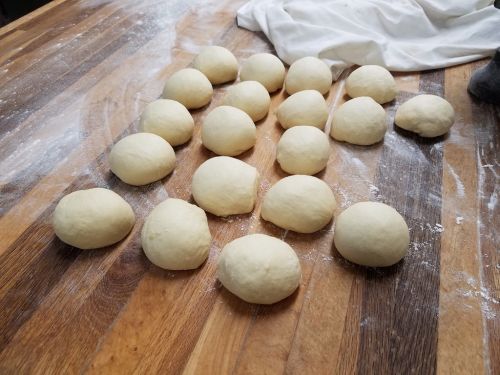
Michael Miller, Director and Bibliographer of the GRHC collection at the NDSU Libraries, recently celebrated 50 years as NDSU staff. “I encouraged TV director Bob Dambach,” said Miller, “that we should explore with the Tri-County Tourism Alliance, to develop a foodways documentary of women in their kitchens in the three counties, that would also include handing down the foodways traditions to the youth, which includes 4H groups. This has been especially well received with the filming with the 4H students and at Napoleon School. Thus ‘Gutes Essen’ became reality, with PPB and the Alliance as co-sponsors.”
Representatives from the GRHC, Prairie Public Broadcasting, and NDSU Libraries met in Jamestown in January of 2016 to discuss the concept and development of the “Gutes Essen” documentary and cookbook. The documentary was released in July of 2017.
“The GRHC has one of the largest collections in the world of Germans from Russia cookbooks in the Archives. We have extensive historical handwritten recipes on cards and notebooks donated for documentation and preservation.” Miller said.
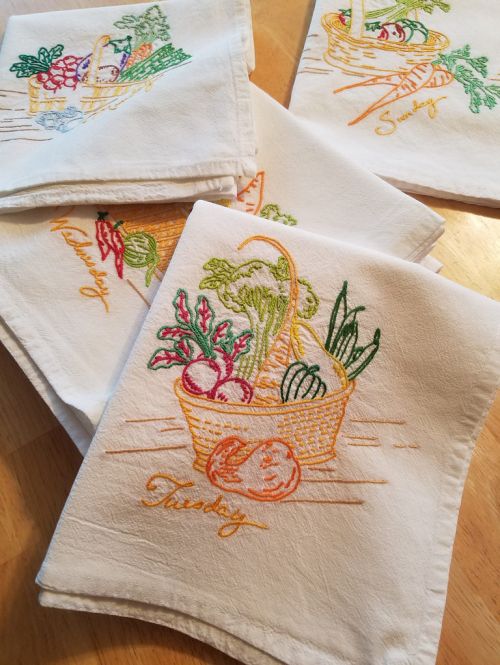
That same year the crew visited the kitchens of ten local women from Emmons, McIntosh, and Logan counties, well versed in the culinary traditions of the Germans from Russia. Think strudels, sauerkraut, fleischkeuchla, borscht, pickled beets, stirrum, knoephla soup, kuchen, and so much more.
The spectrum of people featured in the documentary spanned multiple generations, from elementary school children in Napoleon, Logan County to 101 year old Napoleon-born Carolyn Kuhn Sperle.
Contributor Sue Kaseman Balcom cooks and bakes in the tradition passed down to her from her grandparents. In the documentary Balcom is shown hosting a cheese button party in which she and a group of 4H kids prepare the dish.
The German Russians were notoriously hardy people, many of them farmers and no strangers to hard work and living off the land. Their diets consisted of little meat and a considerable amount of produce cultivated from their gardens and meticulously canned and pickled. Oh yeah, and lots of dough, whether it be the breading for fleischkeuchla or fresh baked bread.
When asked how receptive the school children were toward these traditions, Balcom said, “The Napoleon school students were familiar with farming, cooking, canning and sauerkraut. They were an exemplary group of students and listened intently.” She went on to say, “ They rocked the kraut demo and shredded 35 pounds of cabbage in a very short amount of time.”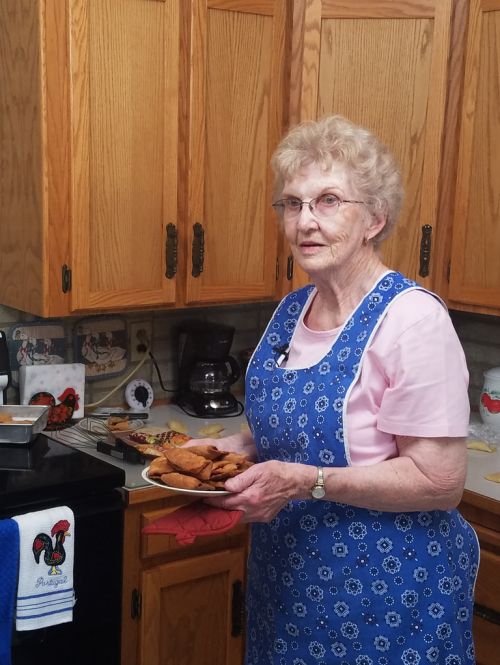
In the documentary Sperle shares her family history and her borscht recipe. Though the borscht isn’t the beet-oriented soup many of us are familiar with. “The Borscht served often in cafes in Odessa, Ukraine does not include meat like in North Dakota and also includes green Borscht. Cream is added like they do for some families in the Dakotas.” says Miller.
During the filming process they also explored hometown bakeries that prepare both handcrafted and mass-produced kuchen and family-owned butcher shops that are state-renowned for their homemade sausage. They also attended and explained the church fair and supper in the town of Strasburg’s iconic Sts. Peter & Paul Catholic Church, and were present for Wishek’s 91st annual Sauerkraut Day.
Speaking of kuchen, did you know you could tell if a family was Catholic or Protestant based on their kuchen crust? The Protestants let their crust rise while the Catholics preferred theirs unleavened.
“Every one of the cooks we interviewed and then selected for the documentary were willing participants,” said Bob Dambach, Director of Television at Prairie Public. Each brought their own sparkle to the program. The 4H kids with Marge Horner and the Napoleon school children with Sue Balcom were not staged. We tapped into existing ongoing programs.
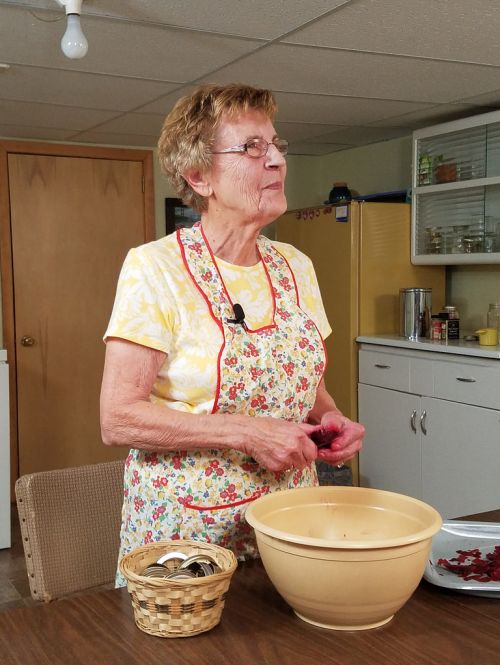
“The Documentary came first, then the cookbook. Even though we were exploring doing a cookbook at the same time that we were planning the shooting of the documentary. I believe they complement each other very well.”
Sue Balcom has penned a number of books published by the Tri-County Tourism Alliance. In addition to extended interviews on Prairie Public’s Youtube channel, Balcom also has a channel in which she documents her own traditional fare. She said, “In our research with the elders, we have discovered that a lot of their recipes were never written down and certainly not measured. They cooked with a sense of feel. Like making bread dough--they just put it together. They just really had a feel for it. I always attributed that to loving what you do.”
The GRHC has released a number of books and documentaries over the years, but the cookbooks continue to be the most popular and can be found on the GRHC website or at various holiday showcases, such as Pride of Dakota.
“Good Eating in German-Russian Country” will air on Prairie Public TV, at 7pm, Tuesday, 5 December, as a pledge show. The new Gutes Essen documentary and cookbook will be available as pledge items.
YOU SHOULD KNOW
“Good Eating in German-Russian Country” Tuesday, December 5, 7pm
To order the “Gutes Essen” cookbook,
www.ndsu.edu/grhc at Shop Online.
January 12th 2026
November 18th 2025
November 12th 2025
September 16th 2025
August 19th 2025


_(1)_(1)_(1)_(1)_(1)__293px-wide.jpg)


__293px-wide.png)